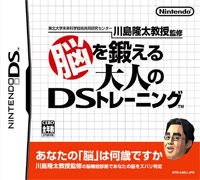
It tells you a lot about both the game industry, and Japan itself.
The game? Nintendo's 東北大学未来科学技術共同研究センター川島隆太教授監修 脳を鍛える大人のDSトレーニング. That's right! "Touhokudai Gaku Mirai Kagakugijutsu Kyoudoukenkyuu Center: Kahashima Ryuuta Kyouju no Nou o Kitaeru Otono DS Training".
Seriously.
You can call it Brain Training.
Brain Training is, basically, an application — one you just happen to play on a handheld videogame system. In this case, the system is Nintendo's DS — a quirky, two-screen-with-touchscreen handheld system that's technically creakier than Sony's PSP, but which has lived up to its intended purpose of generating innovative new styles of games for a new generation of gamers.
And what does Brain Training do? Well, you hold your Nintendo DS like a book (with left and right screens), and you basically use the touchscreen to undergo a wide variety of simple, cleanly-designed, interesting exercises intended to make you smarter. Or, at least, keep your brain sharp and fresh and delicious. At the end of your "fun", the game eventually calculates and reports your "mental age" — often with painful/comedic effect — and tracks your progress over the weeks and months of self-education. And that's about it.
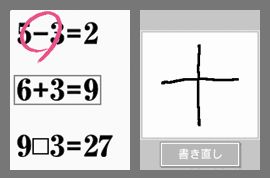
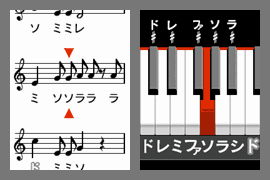
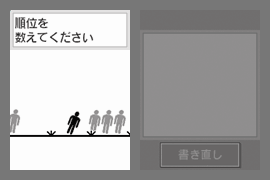
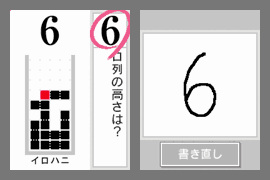
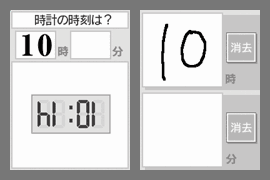
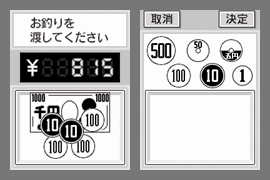
Sales Madness
It may sound painfully simple, but it's been unstoppable. From Dec 26th to January 1st, Brain Training 2 sold 414,556 copies. In one week. It has consistently been the number one videogame since its release, and — this is important to remember — it's not even a videogame. Has it driven hardware sales? In the same period, the Nintendo DS moved 390,181 units. That's more units sold than every other hardware system that week — combined. (Yes, that's two dramatic ItalicsFacts!)Most importantly, though, Brain Training is doing what Nintendo said they would do but nobody really believed them on: opened gaming up to a whole new generation of players. Seeing grandmothers on the train holding their Nintendo DS like a book sends an instant signal — "brain training in progress".
How It All Came Together
I asked Nobuhiro "Noby" Hasegawa — President and CEO of the monolithic, sprawling Japanese entity known as Panic Japan — to elaborate on what makes it so successful.Here's what I learned from him.
1. There's an existing brain-training boom in Japan.
Dr. Kawashima, the creator of Brain Training, is leading authority in Japan on brain medicine. His research shows that:
- The brain becomes weaker every year, just as the body becomes weaker every year
- Effective training is a way to regain body strength
- The brain can also be trained, and can be rejuvenated
- The brain doesn't need difficult training: even easy work is effective, like reading a book out loud, simple calculations, etc.
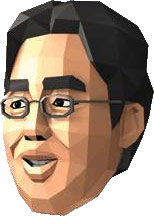
Freaky Polygon Dr.Kawashima
On the other hand, when very simple calculations are performed quickly, the brain lights up like a drunk at a drunk convention. It also shows lots of activity when sentences are simply read aloud.
With this research, Dr. Kawashima published a "training manual" for the brain, and it became incredibly popular. They were usually bought as presents from grandchildren and children for their parents and grandparents.
Is it junk science? Is there truth to it? I'd certainly love to know more, but it's already all the rage. To quote Noby: "People always want to remain young! Health and dieting are always interesting. Now, this is true with the brain as well."
2. The Japanese don't necessarily attach stigmas to "childrens" activities.
In America, most adults don't read comics, or play videogames. This is, of course, changing, presumably as my generation grows older and has kids (bring it, Jack Thompson!), but it's still basically true. Games aree children's activities — not for adults.
Of course, in Japan, manga is hugely popular, and the enduring image of a expensive-suited businessman reading a thick-as-a-baby's-arm comic book on the way to his desk job is as strong as ever.
Thus, as Noby said, "the sense of resistence of the Japanese adult to Nintendo DS's Brain Training was little."
3. It's priced really well.
It costs about 2,800 yen in Japan — $25 — the same price as two Brain Training textbooks. So, anyone considering a purchase of the books will likely consider the game.
4. Really, it's a fiendish trojan horse.
But, the parents will need a Nintendo DS to play, right? Will an adult buy one just for Brain Training? No, and they don't need to — their children already own one. And thus, the true genius of Nintendo's trojan-horse "Touch Generations" concept is revealed.
Many parents might be reluctant to pick up a game system for their children. Noby specifically uses the (somewhat sexist but contextually-correct) example of "Game System vs. Japanese Mom", which he puts this way: "A game system is obstructive for cleaning. The controller is complicated so Mom doesn't want to try it. It gets in the way of the child's studying. Etc." In order for the game machine to succeed in the household, it'll basically need the mother's approval.
The adult only needs to borrow the game system while, say, the child is at school, furiously Brain Training while the child is, presumably, learning themselves. Before you know it, the game system is something mom uses — every day.
Noby concluded, "I expect that Nintendo developed BRAIN TRAINING as a method for obtaining the video-gaming approval of parents. And, the attempt seems to have succeeded."
Nintendo wins, and the industry grows. Tricky!
What does it all mean?
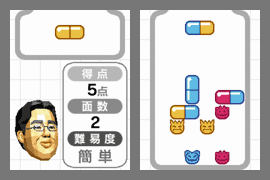
The included "Relax Mode", a.k.a. Dr. Mario
At first it's hard to imagine something like Brain Training ever hitting the top of the USA video game charts. Virtually impossible, I'd wager.
But, if you had told me that "Deer Hunter" would've become the top-selling computer game a few years ago, I would have pulled the car over and laughed you out of it — and yet, it happened, stunning a whole generation of developers who were working on "Brown Devil Alien Guns III"-style games.
Both successes tell a valuable lesson: there are a lot of people who could play video games, but don't, because the right software isn't there.
This is also interesting to me because we've already watched applications slowly becoming more "fun" on the Mac, a testament to simplified design and strong UI. In fact, the whole iPhilosophy seems to be taking complex tasks and boiling them down to bare but highly enjoyable essentials, creating applications that — yes — anyone can use.
Even creating a DVD in iDVD is now just as much "work" as it is "fun": setting your goal, trying different themes, experimenting with music, dragging and connecting all of the pieces together, managing available disc space, testing it all out, etc. With a certain degree of ridiculousness, I'll say this: iDVD is basically a 2D strategy game without the historical setting.
Brain Training may be the very first app hiding out as a "game", and the lines, as mentioned, will only blur further. I like this.
But most importantly, I look forward to picking up Brain Training's US release. Even if it doesn't catch on like wildfire, I look forward to training the hell out of my brain. I secretly hope it will grow to kick other brain-asses.


45 Comments:
Now back to playing Mario Kart while I wait for my Xcode project to build...
I think that with the experimental release (and success) of Electroplankton in the US, Nintendo may be more intrigued to bringing these "non-game" games.
I'll definitely be ordering this if and when it's available in the states.
About time, I say!
it's a new concept in gaming, using the concept of a "game" for various training purposes. the military has already developed an arsenal, as it were, of applications which are starting to trickle into mainstream use.
My wife, who doesn't even play MineSweeper, would love to buy a DS and the game.
That's exactly what I thought when I finished my first DVD.
"Otono" should be "Otona no" — "for adults".
Here's hoping that Dr. Kawashima is still within the game! :)
You're on Boston.com. I blogged about this post on the Boston Globe Business Filter - http://www.boston.com/business/blog/filter/2006/01/brain_training.html
Peter Carabi
pcarabi@scilearn.com
www.positscience.com
Its not cool its greate, and i want it
What's your mental age?
Post a Comment